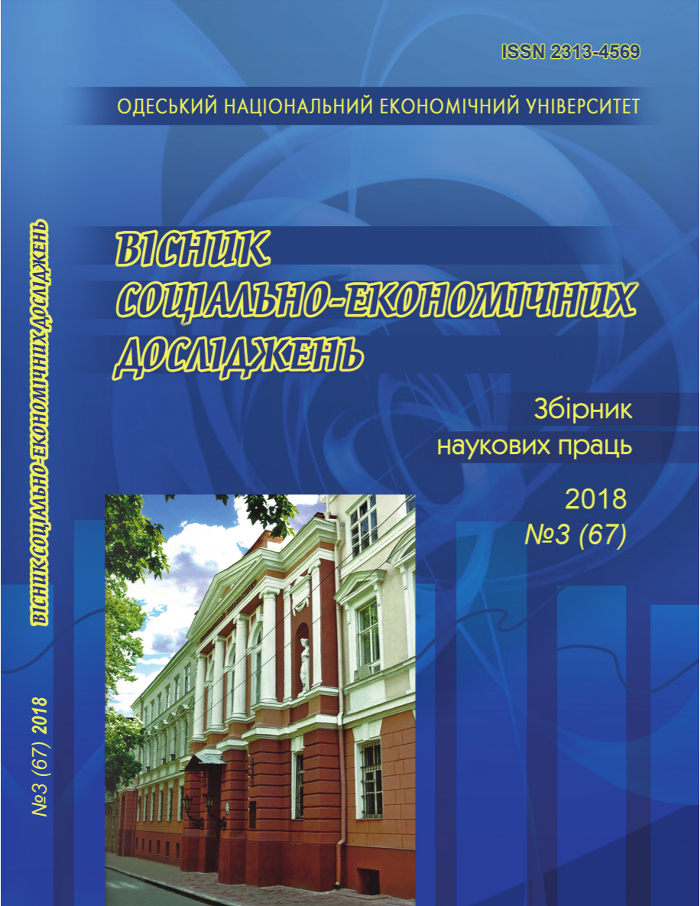Етнокультурні особливості міжнародних економічних відносин : глобальні виклики
DOI:
https://doi.org/10.33987/vsed.3(67).2018.19-27Ключові слова:
культурні цінності, неформальні культурні інститути, національна господарська ментальність, культурна дистанція, культурно-історичний капітал, крос-культурна компетентністьАнотація
У статті розглянуто процес «повернення» культурних понять до мейнстриму економічного мислення, ріст визнання суттєвої ролі етнокультурних чинників в господарських процесах. Проаналізовано різні підходи до вивчення впливу історично сформованих національних культурних стереотипів на економічний розвиток та, зокрема, на міжнародні економічні процеси в глобалізованому світі. Сформульовано розуміння культури в її значимості для господарських процесів, а саме – як неформальних інститутів, які є продуктом тривалого історичного розвитку народів як колективних психічних стереотипів та способів поведінки, що стійко передаються з покоління в покоління і істотною мірою визначають, мотивують та формують економічну діяльність та взаємодію економічних акторів. Показано, що сучасні дослідження приділяють найбільшу увагу розгляду впливу культурно-історичного капіталу різних народів на їх економічний успіх порівняно з іншими країнами, на міжнародну конкурентоспроможність національних економік. У зв’язку з цим аналізуються культурно-історичні основи високої підприємницької активності, креативності, ставлення до праці. Основна увага приділяється огляду досліджень культурних аспектів міжнародної економічної взаємодії, зокрема, впливу культури на динаміку міжнародної торгівлі, конкурентоспроможність національних економік, на прийняття рішень щодо характеру та напрямку виходу мультинаціональних компаній на зовнішній ринок, питання крос- культурного менеджменту. Розглянуто різні підходи до міжнародного ділового спілкування на етапі переговорів. Зроблено висновки щодо необхідності підвищення крос-культурної компетентності представників бізнесу як умови підвищення конкурентоздатності як окремих компаній, так і національних економік.
Посилання
Beugelsdijk, S., Маseland, R. (2011). Culture in economics. History, methodological reflections and contemporary applications. Cambridge University Press, 388 p.
Landes, D. S. (1998). The wealth and poverty of nations. Why some are so rich and some so poor. W. W. Norton & Company, New York – London, 650 p.
Acemoglu, D., Robinson, J. (2012). Why nations fail? The origins of power, prosperity and poverty. Crown business, New York, 529 p.
Koslowski, P. (1994). Prinzipien der ethischen ökonomie: grundlagen der wirtschaftsethik und der auf die ökonomie bezogenen ethik. Mohr Siebeck Verlag, Tübingen, 339 s.
Harrison, L. E., Huntington, S. (2000). Culture matters: how values shape human progress. Basic Books, New York, 348 p.
Fukuyama, F. (1995). Trust : the social virtues and the creation of prosperity. Free Press, New York, XV, 457 p.
Hofstede, G., Minkov, M. (2010). Cultures and organizations: software of the mind. 3rd ed. McGraw-Hill, New York, 550 p.
Trompenaars, F., Hampden-Turner, C. (2012). Riding the waves of culture. Understanding diversity in global business. 3rd ed. Nicholas Brealey Publishing, Boston-L., 274 p.
Lewis, R. D. (2000). When cultures collide: managing successfully across cultures. Nicholas Brealey Publishing, London, 462 p.
Mathers, Rachel L., Williamson, Claudia R. (2011). Cultural context: еxplaining the productivity of сapitalism. Kyklos, May 2011, Vol. 64, No. 2, pp. 231–252.
Crawford, D. (2000). Chinese capitalism: cultures, the Southeast Asian region and economic globalisation. Third World Quarterly, Vol. 21, No. 1, pp. 69–86.
Hennart, Jean-Francois & Larimo, J. (1988). The impact of culture on the strategy of multinational enterprises: does national origin affect ownership decisions? Journal of International Business Studies, No. 29 (3), pp. 515–538.
Kogut, B., Singh, H. (1988). The effect of national culture on the choice of entry mode. Journal of International Business Studies, No. 19, pp. 411–432.
Shane, S. (1992). Why do some societies invent more than others? Journal of Business Venturing, No. 7, pp. 29–46.
Аuzan, А. (2017). Development and «gauge» of dependence [Razvitie i «koleya» zavisimosti], Mirovaya ekonomika i mezhdunarodnye otnosheniya, T. 61, No. 10, s. 96–105 [in Russian]
Latova, N. V., Latov, Yu. V. (2008). Ethnometric approaches to the comparative analysis of economic and cultural values [Etnometricheskie podkhody k sravnitelnomu analizu khozyaystvenno- kulturnykh tsennostey], Voprosy ekonomiki, No. 5, s. 81–102 [in Russian]
World Economy (2016). 3rd ed. Ed. by Yu. Kozak, CUL, Kyiv-Katowice, 185 p.
World economy and international economic relations (2016). Ed. by Yu. Kozak, T. Shengelia. PH «UNIVERSAL», Tbilisi, 223 p.
Groshev, I., Krasnoslobodtsev, A. (2017). About the influence of culture on the country economic development [О vliyanii kultury na ekonomicheskoe razvitie strany], Оbshchestvo i ekonomika, No. 1, s. 117–134 [in Russian]
##submission.downloads##
Опубліковано
Номер
Розділ
Ліцензія
Авторське право (c) 2018 Вісник соціально-економічних досліджень

Ця робота ліцензується відповідно до Creative Commons Attribution 4.0 International License.






